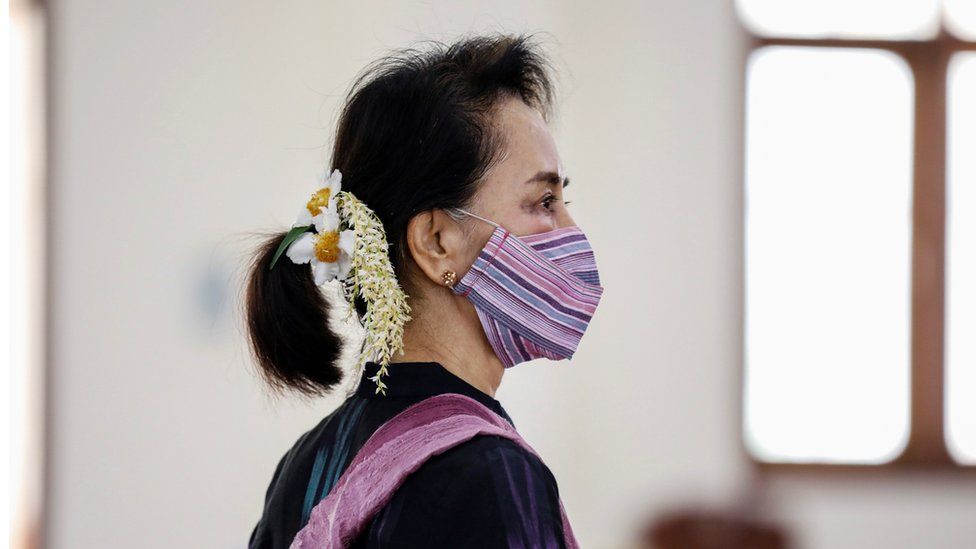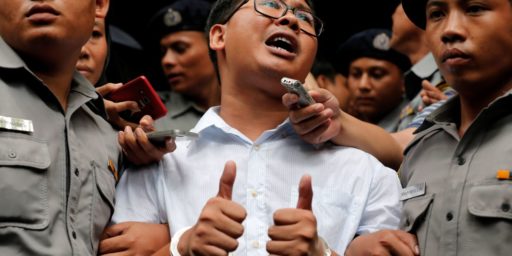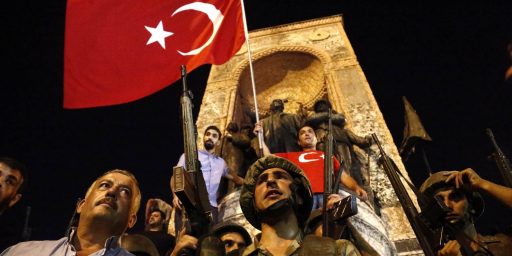Burma Military Coup Ousts Suu Kyi
Aung San Suu Kyi and her top officials are under house arrest.

AP (“Military takes control of Myanmar; Suu Kyi reported detained“):
Myanmar military television said Monday that the military was taking control of the country for one year, while reports said many of the country’s senior politicians including Aung San Suu Kyi had been detained.
An announcement read on military-owned Myawaddy TV cited a section of the military-drafted constitution that allows the military to take control in times of national emergency. It said the reason for takeover was in part due to the government’s failure to act on the military’s claims of voter fraud in last November’s election and its failure to postpone the election because of the coronavirus crisis.
The announcement and the declaration of a state of emergency follows days of concern about the threat of a military coup — and military denials that it would stage one — and came on the morning the country’s new Parliament session was to begin.
The takeover is a sharp reversal of the partial yet significant progress toward democracy Myanmar made in recent years following five decades of military rule and international isolation that began in 1962. It would also be shocking fall from power for Suu Kyi, who led the democracy struggle despite years under house arrest and and won a Nobel Peace Prize for her efforts.
Suu Kyi’s National League for Democracy released a statement on one of its Facebook pages saying the military’s actions were unjustified and went against the constitution and the will of voters. The statement urged people to oppose Monday’s “coup” and any return to “military dictatorship.”
BBC (“Myanmar coup: Aung San Suu Kyi detained as military seizes control“) adds:
In the early hours of Monday the military said it was handing power to commander-in-chief Min Aung Hlaing because of “election fraud”. Soldiers are on the streets of the capital, Nay Pyi Taw, and the main city, Yangon.
The military says it found millions of irregularities in parliamentary elections lost by the army-back opposition in November. The election commission has rejected the fraud claims.
But the army had threatened to “take action” and now says it will use its emergency powers to organise a new vote.
Mobile internet data connections and some phone services have been disrupted in major cities. Communications with Nay Pyi Taw are down and it is difficult to assess the situation there.
NYT )”Myanmar’s Leader, Daw Aung San Suu Kyi, Is Detained Amid Coup“) adds:
Mobile networks and the internet were intermittently down in major cities, and some local journalists went into hiding for fear that their reporting could compromise their safety. Domestic flights were suspended, and the main international airport in Yangon, the largest city in Myanmar, had been shuttered, according to residents.
Dozens of trucks filled with dancing and cheering pro-military forces rolled through the city, as the sound of army anthems filled the air. In some neighborhoods, flags emblazoned with the National League for Democracy’s fighting peacock had disappeared overnight.
Myanmar had been celebrated as a rare case in which generals willingly handed over some power to civilians, honoring 2015 election results that ushered into office the National League for Democracy.
The stalwarts of that party had spent years in jail for their political opposition to the military. Ms. Aung San Suu Kyi, the political party’s patron saint, spent 15 years under house arrest and won a Nobel Peace Prize in 1991 for her nonviolent resistance to the junta that locked her up.
The report eventually points out that the country really wasn’t that democratic:
As it began its political evolution, Myanmar was lauded by Western governments, including the Obama administration, as a democratic beacon in a world where authoritarianism was on the rise. But the political transition in the Southeast Asian nation was never quite as smooth or as significant as the political fairy tale made it out to be.
The army, which began a political transition toward what it called, confusingly, “discipline-flourishing democracy” in 2011, made sure to keep significant power for itself. One quarter of Parliament is filled by men in military uniforms. Key ministries are under army control. And in the chaotic years of early democratization, fire sales of state assets often ended up with military companies or their proxies capturing the choicest prizes.
In 2017, the military stepped up its brutal campaign against the Rohingya, compelling 750,000 members of the Muslim ethnic minority to flee to neighboring Bangladesh in one of the largest global outpourings of refugees in a generation. United Nations officials have said the mass burnings of Rohingya villages, complete with systematic executions and rape, were carried out with genocidal intent.
President Biden’s administration is reviewing whether the United States will officially label the campaign against the Rohingya genocide. Western nations, including the United States, have already slapped financial sanctions on some high-ranking officers implicated in the violence against the Rohingya, including General Min Aung Hlaing himself.
One has to endure much further into the report to get any hint that the Nobel peace laureate is no democrat.
In recent years, Ms. Aung San Suu Kyi, once celebrated as an international champion of human rights for her campaign of conscience against the junta while under house arrest, emerged as one of the military’s biggest public defenders. Despite a mountain of evidence against the military, she has publicly rejected accusations that the security forces waged a genocidal campaign against the Rohingya.
It’s more than that. At very least, she’s defended and enabled the genocide. At worst, she’s fomented it. Indeed, major human rights organizations, including Amnesty International and the US Holocaust Museum, have denounced her, stripping her of awards they presented her when she was still seem as some kind of hero.*
Still, her party certainly won the election and did so in a landslide. What the coup means for the longer term is unclear.
Jonathan Head, BBC’s South Asia correspondent, provides this analysis at the same link as the earlier news report:
So it’s official. The armed forces in Myanmar have confirmed that they have carried out a coup d’etat, their first against a civilian government since 1962, and in apparent violation of the constitution which the military promised to honour as recently as last Saturday.
[…]
The timing of this coup is also easily explained. This week the first session of parliament since the election was due to start, which would have enshrined the election result by approving the next government. That will no longer happen.
But the military’s longer game plan is hard to fathom. What do they plan to do in the year they have given themselves to run the country? There will be public anger over a coup so soon after an election in which 70% of voters defied the Covid-19 pandemic to vote so overwhelmingly for Aung San Suu Kyi.
At the very least, one would expect the intensity of the violence against the Rohingya to increase.
___________________
*I was going to criticize the paper’s obsequiousness in referring to Suu Kyi with the honorific “Daw” in their headline and lede, but that’s apparently a function of their house style.






This is the kind of story about which I would like to say I’m surprised and disappointed.
In case anyone needed a more unambiguous example of a coup.
@Steven L. Taylor: Yup. The thought occurred to me as well.
The similarities, down to the unfounded “stolen election” claims, are obvious. But the differences are rather more important.
If not for the Rohingya genocide, I might feel some concern for the deposing of Aung San Suu Kyi, but it was obvious that elections were a thin veneer for a military controlled state. Now it unambiguously is a military dictatorship.
A story that has always stuck with me is from the the 1979 “12 December” coup in South Korea (ROK). Coup leaders had seized the ROK Army Chief of Staff (CoS), and it was widely expected the CoS would be quietly liquidated (along with a laundry list of others).
It just so happened that the CoS had his birthday the same week as the coup, and the U.S. Forces Commander in Korea (Gen Wickham) had sent the CoS a birthday card. Regardless of whether this was 5 dimensional chess, or Wickham’s secretary just happened to act on a calendar reminder, the coup leaders apparently took this as a message the U.S. was not prepared to accept a bloody purge. Allegedly, when the CoS received the birthday card in his cell, he was overcome with emotion.
Nearly every report I’ve seen on the coup has been burying the lede here.
I know roughly one thing about Myanmar — genocide with Facebook ratcheting up tensions, perpetrated by Buddhists. And, when there’s a coup in a country which is committing genocide, it’s hard to know whether that’s a good thing or a bad thing.
Fragile democracy, Nobel prizes, claims of election fraud… all important, and all serve to distract from the question.I’m a reasonably bright guy who skims a lot of news, and I think our newspapers are doing a crappy job putting this coup in context.
We have zero influence over Burma, especially now when they’ve been treated to the spectacle of Trump being spanked by Xi. (And Chubby Kim, too.) We’re not just the weak horse, we’re the weak horse way far, far away. China won the trade war. China won the Covid war – their economy is growing. China is stronger today than it was four years ago and it’s probably too late to do much to stem the advance of Chinese power.
China has taken down Hong Kong. Their outrageous territorial waters claims are going unchallenged. Taiwan is doomed. Philippines has already put some distance between us and them. Weakness in Indonesia and Malaysia means China controls Japan’s shipping lanes to the Gulf, the Suez Canal and Europe. Japan has got to be asking itself how long it can resist the tidal pull of China. The Chinese navy now has a clear path around our picket wire. We lost that fight without a whimper. The only counter to Chinese power would be a much stronger India.
Erm, haven’t we seen this before? I guess the military got tired of working through puppets.
Maybe to gain a modicum of international legitimacy the war against the Rohingya may abate.